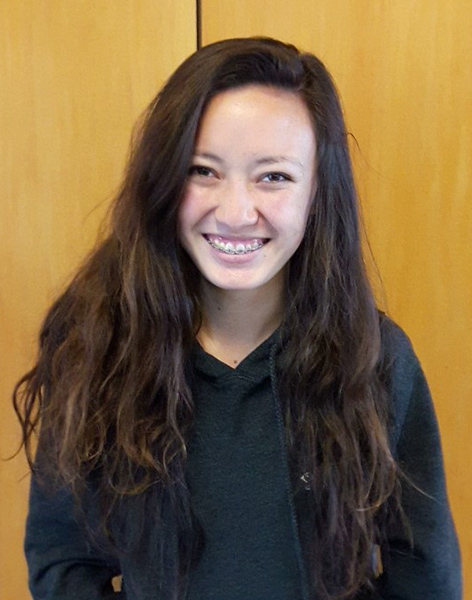The Ideals Behind The Ideal Body Type

RUNNING: Sophomore Peyton Bischof smiles happily after PR-ing in the last track and field meet. She says, “Thank goodness I finally dropped time. I have been working so hard.”
May 3, 2018
In the ever expanding world of athletics and sports the idea of the “perfect body type” is becoming more and more prominent. The chances of success are seemingly plentiful, and sports are just another way to escape into the goal of what is painted by society as a good and successful life. In order to achieve said “perfect body,” one such path tends to be through strict diet and/or exercise regimes.
Fortunately, body type in sports do not seem to be as important as many may think. Freshman cheerleader Keely Saviello says, “Despite the stereotype of cheerleading being really strict when it comes to our bodies, the coaches and team are really accepting of pretty much all types of people, big or small.” Saviello says, “If you are willing to work hard and show that you really want to make it, you’ll make it.” In regards to if there was an ideal body type, Saviello says “There is, but only really for certain positions, so if you would want to be a flyer, being small and light is helpful, but if you want to be a base (one of the ones who catch the fliers) then being a little bigger and taller is really good.” Saviello boasted, “There is no alienation among the group, and although I’m teased for being short, I know that we all love each other, and I’ve never felt held back because of my body.” It is very delightful to learn that one of the most stereotypically exclusive sports in high school is actually home to an incredibly accepting and loving community. Another surprisingly accepting sport is soccer, or ‘futbol’ as they say pretty much everywhere else. According to sophomore Julie Miller, “There is a place for everybody pretty much in soccer. There are so many positions that you are bound to find one that fits you.” Miller says, “Our coaches don’t really tell us what to eat, other than generally telling us to not eat junk food all the time, and to drink plenty of water.” While a body type may feel like it is needed, sometimes a drive to work hard is perfectly sufficient in order to succeed. Miller says that “despite that fact that I’m pretty short, I don’t want it to hold me back, so I do my best to get work past it.” A body is only a physical vessel, and it is often said that any sort of exercise is 90 percent mental and 10 percent physical.
Although a certain body type may be advantageous, a good and balanced diet is also something considered very important by many of our athletic peers. Sophomore Shirley Su says that “during the entire swim season, we mostly focus on proteins and carbs for fuel, and on top of that, after you finish practice or a meet, you tend to eat a ton of food afterwards.” On top of a food-oriented plan, Su also says that “swimming is really an option for everybody. There is advantages found in really all the body types, even with the extremes of both sides.” Similar with cheerleading, it is very heartwarming to hear about how swimming can be for everybody. But, the question of diets still remain. Quite a few people agree that following a food regime or specific diet could improve their performance, such as sophomore cross country runner Torin Carmichael who says, “I feel like following a diet or something that would help me could possibly improve my times and stuff, but it would have to be pretty reliable.” Along with diet, it does seem pretty uncommon for coaches and such authoritative figures in a sport to suggest or push forward any sort of dietary specifications. Su says that “all my coaches just tell me to drink water and eat when I am hungry. They have never really contacted us about specific regimens or plans for our diets.” Among the drive for success in sports is found the desire to work and push oneself to obtain that oh-so close goal.


